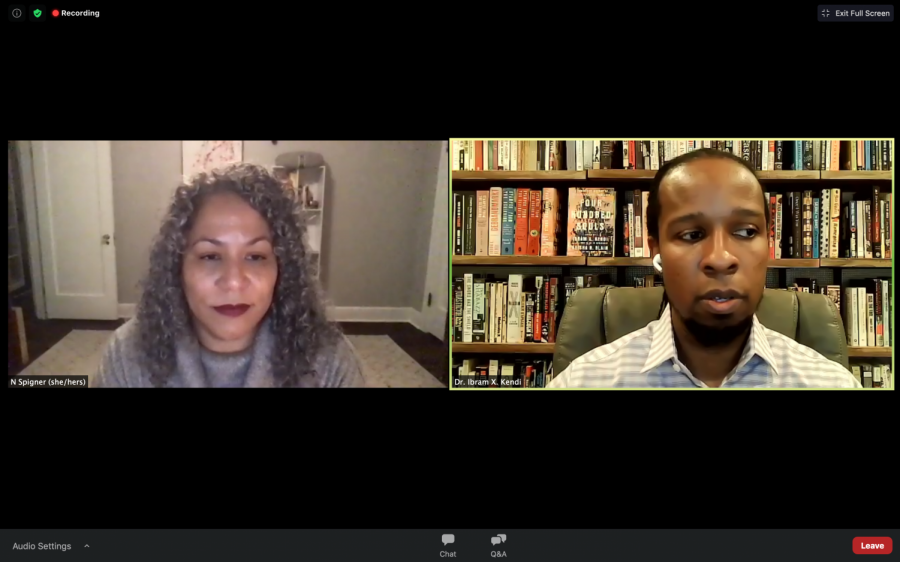Ibram X. Kendi talks antiracism and policing in FMO- and PU-sponsored event
Maia Pandey/The Daily Northwestern
Ibram X. Kendi talked about antiracism and policing in the hour-long event Thursday night, moderated by American Studies Prof. Nicole A. Spigner.
February 16, 2021
For Members Only and Northwestern Political Union hosted author and professor Ibram X. Kendi for a conversation on antiracism and policing Thursday night.
African American Studies Prof. Nicole A. Spigner began the event by asking Kendi, who is the founding director of Boston University’s Center for Antiracist Research, how individuals can practice antiracism in a racist world.
“The question for the individual is, ‘Are we upholding this system of racism or are we challenging it?’” Kendi said. “It’s not enough for us to recognize that the problem is power and policy… we then have to figure out how we as individuals can be a part of this larger struggle against power and policy.”
Structural racism stems from a history of policies that disproportionately harm Black and brown people, Kendi said. To eradicate institutional racism, societies need to build a new structure on a foundation of antiracist policies, he added.
Antiracist policies benefit all people, not just people of color, Kendi added, citing how the Affordable Care Act (ACA) gathered widespread support after it became law. White Americans who were fearful of the bill’s passing realized they, too, benefitted from policies like protections for pre-existing conditions, Kendi said.
“When you create more equity between groups, that actually brings people together,” he said. “We talk all the time about how divided we are. You have people who imagine that antiracism — something that can bring equity and justice to all — is divisive. No, it’s actually the other way around.”
Spigner also asked Kendi to address the role of police in an antiracist society and on college campuses, given ongoing calls from NU Community Not Cops to abolish University Police.
Kendi said police who arrived on college campuses during protests for civil rights in the 1960s were hired not to keep students or faculty safe, but to “quell student activism.”
These original police departments on college campuses were trained in “counter-revolutionary techniques,” he added, much like the very first iterations of police in the U.S.
“Police emerged primarily as slave patrols to, again, quell the activism of people who are clamoring to be free,” he said. “Police have largely been operating in a society where people are commonly misled into believing that you have these dangerous, Black neighborhoods with these dangerous, Black people.”
The last half hour of the talk was reserved for audience questions, one of which came from SESP Dean David Figlio.
“As a dean here at Northwestern, I want to engage with our faculty, staff, and students in deep, meaningful, sustained antiracist conversation,” Figlio wrote in his question. “What are some of the biggest mistakes that academic leaders make when they attempt to enact antiracist workshops (and) activities?”
Kendi said he urges academic leaders to see anti-racism as a journey, not something that can be achieved through a single workshop or training session. Instead, universities need to create space for students and faculty to reflect on the policies and practices at the institution and reflect on how they uphold structural racism.
FMO Vice Coordinator of Programming Taylor Bolding said she thought this part of the talk was particularly applicable to the University. While NU often creates task forces or holds roundtables, the Communication senior said, these rarely lead to tangible action.
“That’s where Northwestern falls short. They think because they do the bare minimum we should be grateful,” Bolding said. “You actually have to be committed to becoming an antiracist to recognize that people of color have very particular sets of experiences, due to their race and ethnicity.”
Email: [email protected]
Twitter: @maiapandey
Related Stories:
— ASG creates committee to address internal racism through structural changes
— Angela Davis engages community, student abolitionists in annual State of the Black Union


